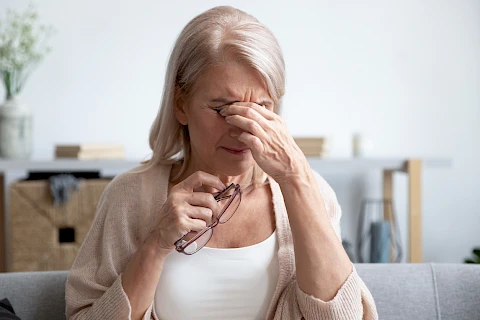
As caregivers, understanding the early signs of glaucoma in seniors can make a significant difference in managing this eye condition and preserving vision. Glaucoma, often called the “silent thief of sight,” is a group of eye diseases that damage the optic nerve, leading to gradual vision loss. It is the leading cause of irreversible blindness in people over 60, making early detection and treatment crucial. This article provides an overview of common glaucoma symptoms in seniors and the importance of regular eye exams, along with resources for management and support.
Common Symptoms of Glaucoma in Seniors
Some symptoms of glaucoma can be hard to notice at first because they develop slowly. You want to keep an eye out for the following common signs.
Gradual Vision Loss
One of the earliest signs of glaucoma is a gradual loss of vision. Seniors may notice that their peripheral vision—their side vision—starts to fade. For example, they might not see objects off to the sides as well as they used to. Seniors might also have trouble adjusting their eyes in low-light conditions, such as at night or in dimly lit rooms.
Eye Pain and Discomfort
Another symptom to watch for is persistent eye pain. This pain might be accompanied by redness and swelling around the eye. While occasional eye discomfort is normal, ongoing pain and visible redness should be addressed by a healthcare professional.
Visual Disturbances
Seniors with glaucoma might also experience visual disturbances. This can include seeing halos around lights, especially at night. Blurred vision is another common symptom. If a family member mentions these vision problems, you need to take them seriously and seek professional advice.
The Need for Regular Eye Exams
Regular eye exams for seniors allow for early detection of glaucoma. The benefits of early detection include starting treatment sooner and slowing the progression of the disease. Eye exams can catch glaucoma before significant vision loss occurs. Eye care professionals recommend that seniors have an eye exam at least once a year. These professionals play a role in managing glaucoma. They can provide the best treatment options and adjust care plans as needed. Regular visits help monitor eye health and ensure any changes are caught early.
Glaucoma Management and Support
Once diagnosed, glaucoma can be managed with various treatments and lifestyle changes. Understanding these options can help caregivers support seniors living with glaucoma. Treatment options usually start with medications. Eye drops are commonly prescribed to reduce eye pressure. In some cases, surgical procedures might be necessary. These surgeries can help to improve the flow of fluid out of the eye or reduce the production of eye fluid.
Lifestyle changes can also make a big difference in managing glaucoma. A healthy diet and regular exercise can help improve overall eye health. It's also a good idea to make home safety modifications. For instance, adding proper lighting and clearing clutter can help seniors move safely around their homes. There are also many support resources available. Local support groups can provide a sense of community and shared experiences. Online resources and communities can be helpful for finding information and support. Knowing these resources are available can make managing glaucoma a bit easier for both seniors and their caregivers.
Be Proactive With Senior Eye Health
Recognizing the symptoms of glaucoma in seniors is very important. Gradual vision loss, eye pain, and seeing halos around lights are common signs. Regular eye exams help with early detection and effective management. If you're a caregiver or family member of a senior, staying informed and proactive about eye care is essential. At Senior Helpers Greenville, we are here to provide personalized care services in Simpsonville and Greenville. Contact us today to learn more about how we can support you and your loved ones.